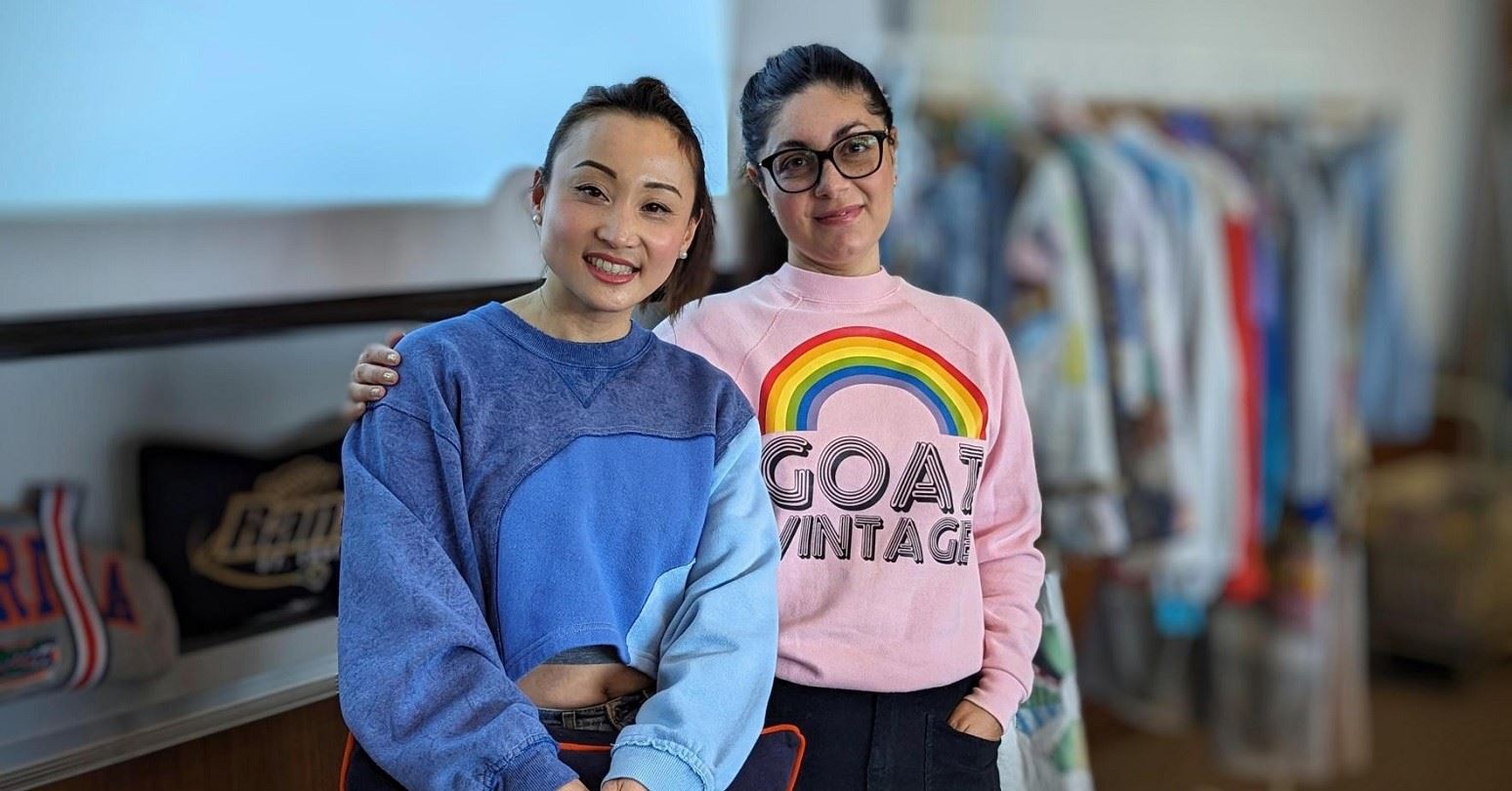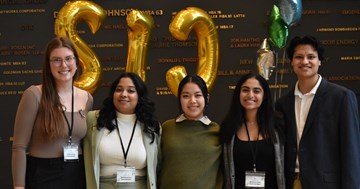The rise of fast fashion has been considered a double-edged sword, on one hand making trendy clothing more accessible to the masses, while on the other hand hurting the planet through pollution and waste.
Sumit Nagi, MBA ’06, has made it her mission to bring sustainability into fast fashion and founded the company GOAT Vintage, which upcycles vintage clothing and makes them into new pieces. Nagi, along with Chloe Hau, GOAT Vintage’s chief operating officer, recently spoke to Ivey students about the potential to rethink the material supply chain in the fashion industry. The GOAT Vintage team spoke to students in Wren Montgomery's Corporations and Society classes on February 27 and then participated in a Sustainable Fashion Forum later that day hosted by the Ivey Degrowth Club in partnership with the Ivey Fashion and Retail Club.
In her blog below, HBA ’25 candidate Sam Lin shares key takeaways from the Sustainable Fashion Forum discussion.
Combining business with sustainable impact
Ivey students are increasingly interested in complementing their business acumen with a perspective on how to make a sustainable impact with their work. That’s where the Ivey Degrowth Club comes in, creating an open space for students to explore topics that expand notions of what success and value in business look like, and challenging the community to explore strategies beyond profit growth at all costs.
At biweekly open forums, the Degrowth Club creates a community of students who can together reimagine what the future of sustainable business can look like. The most recent event featured the executive team from GOAT Vintage, a women-led, BIPOC-owned responsible fashion brand bringing sustainable, upcycled clothing into the forefront of our imaginations. Sumit Nagi, MBA ’06, Founder and CEO, and Chloe Hau, chief operating officer, introduced us to the transformational impact of GOAT Vintage’s upcycled, circular clothing production system.
The event began with a conversation about the implications of fast fashion. Students discussed the human rights impacts of fast fashion production as well as the environmental consequences of mass production. The group identified the difference between a linear supply chain, where natural resources are discarded once used, and a circular one, where resource materials are repurposed or upcycled to make new products, reducing the harm created with constant new production.
Can fast fashion ever be sustainable?
Students also discussed what sustainable fashion entails, reiterating the importance of a change in mindset to challenge the systems of mass production and consumption that currently dominate the fashion industry.
HBA students, Firuza Huseynova and Kiera Taylor, both Ivey Degrowth Club Co-Presidents, moderated the event and introduced a case study on Adidas’ “low-carbon shoes.” Through the conversation, we determined the shoes – while a step in the right direction – are not a complete solution to create true circularity or regeneration in the fashion industry. Due to the remaining impact of the production and material creation of the shoe, the mass production of Adidas shoes still contributes significantly to carbon emissions.
Enter GOAT Vintage: A slow fashion alternative
By repurposing unused clothing materials, GOAT Vintage is rethinking the material supply chain in the fashion industry and challenging our assumptions about what is needed to ensure a sustainable, liveable future.
“We want you to buy half the clothes, but love them twice as much,” Hau said.
Hau and Nagi told us GOAT Vintage is committed to ensuring its core values drive all decisions, with the ultimate goal to have all clothing made from upcycled, repurposed materials. Sustainable growth for GOAT Vintage looks like scaling up operations and upcycling to meet demand from retailers, as well as expanding their workshops and education to push forward the sustainable fashion movement.
“We don’t need to grow for the sake of growth,” Nagi said.
We also learned that GOAT Vintage currently works with high school co-op students to encourage sustainable fashion designs.
Reimagining the future of sustainable systems
Participants left the event inspired that change is possible. Participant Ethan Milroy said he had not previously heard of GOAT Vintage and found it interesting to learn that the company is already established in large retailers, such as Winners. Lauren Meikle, who also attended the event, said companies like GOAT Vintage push everyday consumers to critically evaluate their needs versus wants and help them to resist the temptation to participate in fast fashion microtrends.
As a final takeaway, Huseynova and Taylor encouraged the students to hold brands accountable as individual consumers.
“We shouldn’t be so cynical, because we have the power to make change,” they said.



